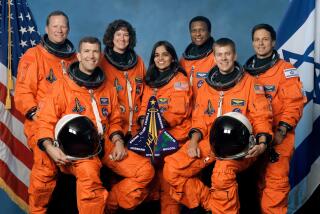A News Voice for the Third World : Television: CNN’s ‘World Report’ celebrates its fifth anniversary with a two-hour retrospective on Sunday.
- Share via
NEW YORK — In 1987, CNN founder Ted Turner called Stuart Loory, a CNN correspondent and former Moscow bureau chief, to discuss an idea that Turner had for a new kind of newscast.
“Ted said that, in traveling in developing countries in Africa, Asia and other regions, he kept hearing criticisms that all of the news flowed from north to south, from industrialized nations to poorer ones, with these countries at the mercy of Western news organizations who parachuted journalists in at times of crises,” Loory recalled. “He said we ought to do a program that would give these countries the opportunities to tell their stories the way they wanted them told.”
Thus was born CNN’s “World Report.” Beginning with only 28 contributors, it has grown into a veritable United Nations of TV broadcasters, with 135 broadcasters representing 110 countries. The giant British Broadcasting Corp. gets equal air time with Mozambique’s TVE and Sri Lanka’s SLRC.
“World Report” is celebrating its fifth anniversary with a two-hour retrospective Sunday (at noon and again at 9 p.m., Pacific time). Normally it is seen for 15 minutes on weekdays at 12:45 p.m. and for two hours on Sundays at noon and 9 p.m.
Each of the contributors is a recognized news-gathering operation with some other outlet for its work and, on a rotating basis, provides CNN with a report of up to three minutes, which the network airs uncut, unedited and uncensored.
“ ‘World Report’ is a very unusual hybrid, an anthology of TV from many sources,” said Everette Dennis, executive director of the Freedom Forum Media Studies Center at Columbia University. “It’s useful to viewers to see world television, some of which is crude and may be gathered in ways that are different from what Westerners are accustomed to.”
The show’s audience is not large by television standards--the weekday show attracts about 468,000 households per day, the one on Sunday about 194,000--but its value is.
“The big plus of ‘World Report’ is that, for the first time, viewers are seeing news with a global perspective, reported by local journalists in the countries where the news is happening,” said Danila Mendoza, coordinating producer for UNTV, the United Nations TV news-gathering operation, which contributes weekly reports on the activities of U.N. agencies around the world to “World Report.” “I am from the Philippines, and Americans tend to see my country (only) on TV for a crisis or the eruption of Mt. Pinatubo.”
Dennis pointed out, however, that, because “90% of TV systems around the world are government-owned, the show features a lot of government press releases. But,” he added, “it’s an interesting alternative to other TV news--like giving people a bunch of newspapers from around the world to read. And it might be a harbinger of future global news programs, where various nations might collaborate on programs about subjects like the environment.”
Loory, who acknowledged that in the beginning even some of CNN’s own producers questioned the idea of turning over the network’s editorial control, maintained that the show achieves a kind of balance over time.
“If we were running only one point of view, then I think we could be accused of being propagandistic,” said Loory, who was the executive producer and editor in chief of “World Report” for its first three years and is now a CNN vice president. “But we run material from everyone--Communist countries and capitalist, Arab and Israeli. We’ve had USA-bashing, and we’ve had stories from South Africa television justifying apartheid, about Cuba under Castro, and Paraguay under Alfredo Stroessner.
“I think we’ve created a marketplace of news and views from different countries. And I believe that the audience is sophisticated enough to be able to tell the difference between news and propaganda. When you have a piece that says, as one piece from Turkey did, that the massacre of Armenians in 1915 never took place, that can be instructive about the country because it’s like Germany saying the Holocaust never took place.”
Moreover, CNN is able to alert viewers to possible bias in a story through the introductions by anchors Ralph Wenge and Ralitsa Vassileva. They may note, for example, that there is opposition to the government view that’s about to be presented. Other times, though, viewers are on their own. A recent segment from RAI-TV in Italy about labor unions striking over cuts in government spending included the reporter stating that doctors and others “pay lower taxes than they should.”
One outcome of Turner’s idea for a global newscast has been to benefit the CNN network itself in its access to foreign countries, Loory said.
“There was a direct relation between ‘World Report’ and our ability to stay on in Iraq during the (Persian Gulf) war,” he said, noting that Iraqi TV had been a contributor to “World Report” for several years before the conflict, and the director-general of Iraqi TV had participated in one of CNN’s conferences for “World Report” contributors in Atlanta.
Apart from the stories about crises and conflicts, “World Report” also presents features about everyday life: a support group for diabetics that eats out in Singapore and takes their blood-sugar measurements in the restaurant, the black market in Red Army uniforms in the former Soviet Union, a literacy campaign in Nigeria in which teachers tell their adult pupils that “a bearded man is no better than a he-goat” if he cannot read or write.
The program also reflects the fractious state of the world today. Nancy Peckenham, who has been executive producer of the show since June, recalled that when CNN held its annual conference for the contributors in Atlanta recently, the panelists from the various factions in the former Yugoslavia “were shouting at each other, reinterpreting events, accusing each other of misreporting stories. But they all have a voice on the show.”
More to Read
The biggest entertainment stories
Get our big stories about Hollywood, film, television, music, arts, culture and more right in your inbox as soon as they publish.
You may occasionally receive promotional content from the Los Angeles Times.










